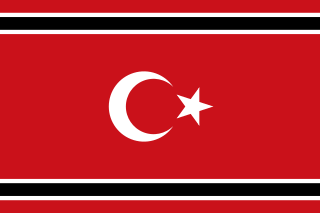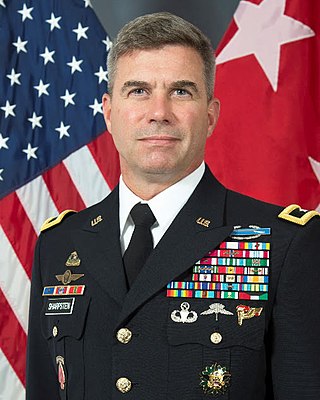
Law enforcement is the activity of some members of government who act in an organized manner to enforce the law by discovering, deterring, rehabilitating, or punishing people who violate the rules and norms governing that society. The term encompasses police, courts, and corrections. These three components may operate independently of each other or collectively, through the use of record sharing and mutual cooperation.

Peace is a concept of societal friendship and harmony in the absence of hostility and violence. In a social sense, peace is commonly used to mean a lack of conflict and freedom from fear of violence between individuals or groups.

Peacekeeping comprises activities intended to create conditions that favour lasting peace. Research generally finds that peacekeeping reduces civilian and battlefield deaths, as well as reduces the risk of renewed warfare.

A military, also known collectively as armed forces, is a heavily armed, highly organized force primarily intended for warfare. It is typically authorized and maintained by a sovereign state, with its members identifiable by their distinct military uniform. It may consist of one or more military branches such as an army, navy, air force, space force, marines, or coast guard. The main task of the military is usually defined as defence of the state and its interests against external armed threats.

A paramilitary is an organization whose structure, tactics, training, subculture, and (often) function are similar to those of a professional military, but which is not part of a country's official or legitimate armed forces. Paramilitary units carry out duties that a country's military or police forces are unable or unwilling to handle. Other organizations may be considered paramilitaries by structure alone, despite being unarmed or lacking a combat role.

A private military company (PMC) or private military and security company (PMSC) is a private company providing armed combat or security services for financial gain. PMCs refer to their personnel as "security contractors" or "private military contractors".

The Free Aceh Movement was a separatist group seeking independence for the Aceh region of Sumatra, Indonesia. GAM fought against Indonesian government forces in the Aceh insurgency from 1976 to 2005, during which over 15,000 lives are believed to have been lost.

Civil-Military Co-operation (CIMIC) is the means by which a military commander connects with civilian agencies active in a theatre of operations.
Power politics is a theory of power in international relations which contends that distributions of power and national interests, or changes to those distributions, are fundamental causes of war and of system stability.
Peace churches are Christian churches, groups or communities advocating Christian pacifism or Biblical nonresistance. The term historic peace churches refers specifically only to three church groups among pacifist churches:

Demobilization or demobilisation is the process of standing down a nation's armed forces from combat-ready status. This may be as a result of victory in war, or because a crisis has been peacefully resolved and military force is no longer necessary. The opposite of demobilization is mobilization, which is the act of calling up forces for active military service. Forceful demobilization of a defeated enemy is called demilitarization.
Civil Affairs (CA) is a term used by both the United Nations and by military institutions, but for different purposes in each case.

The State Peace and Development Council was the official name of the military government of Burma (Myanmar) which, in 1997, succeeded the State Law and Order Restoration Council that seized power under the rule of Saw Maung in 1988. On 30 March 2011, Senior General and Council Chairman Than Shwe signed a decree that officially dissolved the council.

The United Nations Mission in Liberia (UNMIL) was a peacekeeping operation established in September 2003 to monitor a ceasefire agreement in Liberia following the resignation of President Charles Taylor and the conclusion of the Second Liberian Civil War (1999–2003). At its peak it consisted of up to 15,000 U.N. military personnel and 1,115 police officers, along with civilian political advisors and aid workers.

The Department of Peace Operations (DPO) is a department of the United Nations charged with the planning, preparation, management and direction of UN peacekeeping operations. Previously known as the Department for Peacekeeping Operations (DPKO), it was created on 1 January 2019 as part of a restructuring of the UN's peace and security apparatus. The DPO retains the core functions and responsibilities of its predecessor, with a greater emphasis on cohesion, integrating different resources and knowledge, and promoting human rights.

The 1988 Maldives coup d'état attempt was by a group of Maldivians led by businessman Abdullah Luthufi and assisted by armed mercenaries of a Tamil secessionist organisation from Sri Lanka, the People's Liberation Organisation of Tamil Eelam (PLOTE), to overthrow the government in the island republic of Maldives.

Military psychology is a specialization within psychology that applies psychological science to promote the readiness of military members, organizations, and operations. Military psychologists provide support to the military in many ways, including through direct clinical care, consultation to military commanders, teaching others and supporting military training, and through research relevant to military operations and personnel. Military psychology as a field has been growing since the early 20th century, evidence that the demands and needs for psychological clinical and operational application is continuing to grow steadily. There are many stressors associated with military service, including exposure to high-risk training and combat. As such, psychologists are critical support components that assist military leaders in designing appropriate training programs, providing oversight to those programs, and assisting military members as they navigate the challenges of military training and their new lifestyle. Military psychology covers a wide range of fields throughout the military including operational, tactical, and occupational psychology. Gender differences between military-trained personnel who seek mental health assistance have been extensively studied. Specific examples include post traumatic stress disorder (PTSD) associated with combat, or guilt and family/partner difficulties accompanying extended or frequent deployments due to separation. Clinical providers in military psychology are often focused on the treatment of stress, fatigue, and other personal readiness issues. Previous wars such as the Korean war, Vietnam war, and WW 2 provide great insight to the workings and practices of military psychology and how the practices have changed and assisted the military over the years.

The insurgency in Aceh, officially designated the Rebellion in Aceh by the Indonesian government, was a conflict fought by the Free Aceh Movement (GAM) between 1976, and 2005, with the goal of making the province of Aceh independent from Indonesia. The aftermath of a strong military offensive in 2003 and the 2004 Indian Ocean earthquake brought a peace agreement and an end to the insurgency.

Peacekeeping Operations Center is a unit of the Joint Operations Command within the Serbian General Staff. It is the major authority for training, selection, equipping, preparation and deployment of individuals and units from the Ministry of Defense and Serbian Armed Forces to multinational operations outside the borders of Serbia.

Christopher John Sharpsten is a retired United States Army major general who most recently served as the Deputy Director of Supply, Production and Distribution for the United States Department of Defense COVID-19 prevention and treatment logistics program from July 2020 to July 2021. Previously, he served as the Director of Logistics of the United States Central Command from August 2018 to June 2020.
















